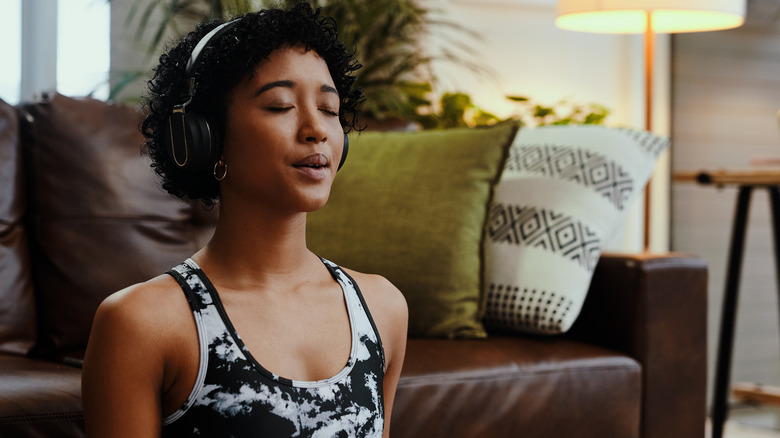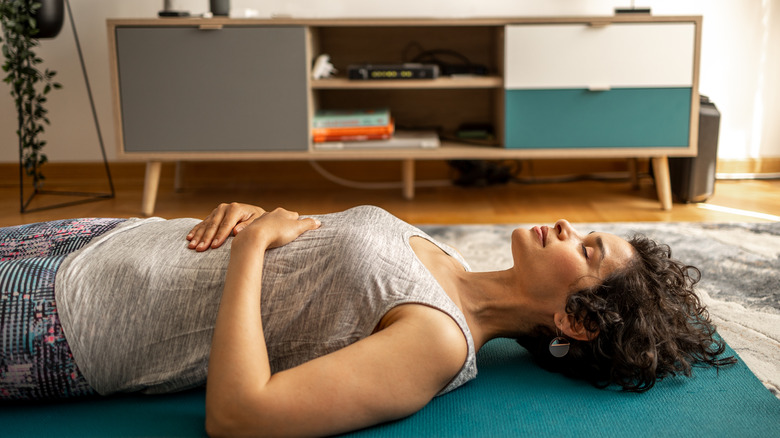Why You Should Turn To Breathing Exercises For Help Relaxing
If you've ever been stressed out and someone told you to "take a deep breath," they weren't dismissing you. Whether they realize it or not, breathing exercises, especially those that invoke deep breathing, actually do induce relaxation. According to a 2017 study published in the Journal of Neurological Sciences, when people engage in deep breathing exercises, both their mood and stress levels improve. The study also found that heart rate and salivary cortisol levels were positively affected, the latter of which is a hormone that's released when someone is experiencing stress, so lower levels are a good thing.
"Slower, deeper breathing, in which you focus on the time that it takes to breathe in and out, is going to be beneficial for your overall health," physiologist E. Fiona Bailey, Ph.D. told SELF. As Bailey explained, it comes down to being mindful with each breath, being able to notice your chest rise up and your stomach expand as you inhale from your diaphragm, then feel the release as the lungs are emptied again. "Deep breathing requires more time for each breath, so you're going to slow down your breathing rate, meaning you're going to breathe less frequently and the volume of air that you take in with each breath is going to be greater than what it is at rest," Bailey shared.
Stress is very common in our culture, as is the physical toll of the anxiety that accompanies it. While you may not be able to eliminate stress altogether (unless you become a Tibetan Buddhist), learning and embracing breathing exercises to get you to a place of Zen just might be the next best thing.
How breathing exercises help with relaxation
In the 1970s, Harvard Medical School cardiologist Dr. Herbert Benson realized deep breathing was a way to alleviate a handful of medical problems, including stress and high blood pressure. To combat these issues, he developed the relaxation response to counteract the "fight or flight" response that comes with stress. At its core, the relaxation response is learning how to breathe deeply as a means of calming ourselves down by stimulating the parasympathetic reaction, also known as the "rest and digest" response, per Harvard Health Publishing.
"The brake works more healthfully than the accelerator here," professor of psychiatry, behavioral sciences, and director of the Center on Stress and Health at Stanford University School of Medicine Dr. David Spiegel told CNN. Deep breathing quickly slows down the heart to a place where stress levels are healthy, explains Spiegel. "We believe breathing is a pathway into mind-body control. It's part of the autonomic system like digestion and your heartbeat, but unlike those body functions, you can easily regulate breathing," said Spiegel. It only takes a few deep breaths for relaxation to start to settle into your mind and body.
Different ways to try this technique
As with anything that requires focus, you want to find a comfy place where you're not likely to be disturbed. You can sit or lie down — whatever feels best for you. After your first initial regular (chest) breath, slowly inhale as deeply as you can from your diaphragm and through your nose, watching your chest and abdomen expand. When you can't possibly take in any more oxygen, exhale it all out just as slowly and deeply. Repeat.
Once you know how to breathe deeply, in a controlled and focused way, you can incorporate other components to induce further relaxation. Closing your eyes and picturing a comforting image, repeating a word or phrase — like a chant or prayer — mindful meditation, and yoga are all examples that can help you further connect your mind to your breath. Then, of course, you want to make it part of your daily routine and practice the technique 10 to 20 minutes a day, per Harvard Health Publishing.
While at first it may be difficult to harness these breathing exercises when you're in the throes of an extremely stressful situation, in time with enough practice, you'll get there if you stick to your routine. According to a 2019 study published in the American Journal of Lifestyle Medicine, it takes about 66 days before a routine becomes an automatic habit. In a lifetime, 66 days is nothing! So maybe it's time to consider getting on your path to more relaxation now.


